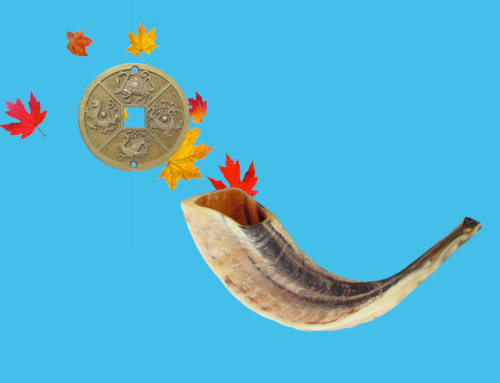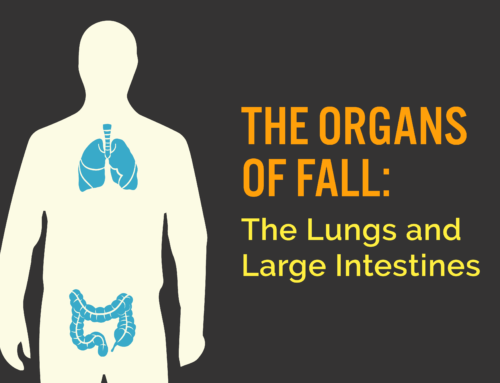Since the start of the pandemic, grief is something we’ve been experiencing on such a large collective scale. The transitional season of autumn is linked to the Lung, which is the yin organ specifically related to the emotion of grief. The Lung’s corresponding yang organ is the Large Intestine, associated with physical and emotional ‘ letting go.’ In this season, we may carve out time to acknowledge and feel our grief, and perhaps find ways to help us process and release it.
First of all, we have to let ourselves and others know, IT’S OKAY TO FEEL OUR GRIEF! Contrary to what many of us have grown up to believe, we can normalize emotions that are simply part of the human experience, rather than pathologizing them in a way that is interpreted as something being ‘wrong.’ In this way, we create a safe space for ourselves and others to feel and process emotion without fear of judgment. If we feel judged by ourselves or others, our emotions are likely to stay repressed and unresolved, and we suffer alone instead of together.
Sometimes acknowledging and just letting ourselves be with our emotions is enough. Other times, we need ways to help process and release what we’re feeling, and grief can be such a pervasive and difficult one to move through. I’m going to throw out a few tips for how to process and release grief through the lens of Chinese Medicine. Try them out if they happen to resonate with you.
Breathe.
Oof, I know. One more person telling you to simply breathe. It’s just one of those things that is so vital and impactful, yet we are constantly forgetting to do it! One of the main functions of the Lung in Traditional Chinese Medicine is inhalation and exhalation of the breath, and also to disperse Qi, or energy, throughout the body. When we experience grief and sadness, our breath is often suspended, affecting the Lung’s movement to take in and let go. Any type of deep, intentional breathing will do here, but a couple specific techniques come to mind.
The first is the breathing exercise where on a long inhale through your nose you tense up your whole body, tightening and scrunching up all your muscles, your face, clenching your fists, bringing your shoulders to you ears, maybe holding the breath in for a few seconds at the top of the inhalation, only to release it with a big loud exhale through your mouth. Repeat this a few times.
The second is called Breath of Joy. Many years ago I had a partner where we would face each other and do this when we were in an argument, increasing the exercise gradually to a somewhat manic speed, we would eventually end up in a fit of laughter. It’s a three part (quick) inhale through the nose, and one part (quick) exhale through the mouth. Standing up, you inhale one part and bring both arms out in front of you, second part you inhale your arms out to both sides, third part you inhale both hands above your head, lastly, with a big loud (Ha!) exhale through your mouth, you swing your arms forward and down, letting your head follow. You repeat this 3-4 times, gradually increasing the speed of breath and movement each round. Here is a demonstration.
Cry.
Each organ has a sound associated with it. For the Lung, it is crying (Oh, the magical alignment of Chinese Medicine), another thing we have a lot of stigma around in our society. Many of us, particularly men, have been taught that crying is not okay, and there is so much shame around it. The fact is that most of the time, crying is simply a RELEASE. A way to loosen the pressure valve. Not only is it one hundred percent valid, it is a very necessary way for us to let go. Before you cry, perhaps if you are holding it in, you can feel the tightness and heaviness in your chest, that is often relieved and lightened once you let your tears flow.
Sing.
Just another way to let grief move through and out of you, while strengthening your Lung Qi. So turn up your favorite tune, and belt. it . out.
Scream.
(Not necessarily at someone!) Grief, as we know, can come and go in waves, and encompasses many different emotions, anger / frustration being among them. If grief is repressed, that typically means there is some Liver involvement manifesting as agitation. The Liver is in charge of the ‘free flow of Qi,’ so if an emotion is stuck, it will lead to a buildup. Again, let it out. Scream in your car. Scream into a pillow. Scream off a mountain top into the abyss. Just get. it. out.
Other stuff.
What are other ways to process and release our grief?
Talk about it; with yourself, through journaling, or with others that you feel safe with. Ask why am I feeling this grief and how is it manifesting?
Another thing that may or may not feel right to you, is to clean and purge physical items in your space as a way to release emotion. Declutter that old junk drawer that’s been overflowing and causing a jam. Scrap that old pair of shoes that your Ex gave you for Christmas 10 years ago. Clear space and get rid of actual physical things that are no longer serving you and notice what shifts emotionally.
And of course, acupuncture. Acupuncture certainly won’t take away your grief (and we wouldn’t want it to since it’s a necessary and natural thing to go through) but it will absolutely help it to move on through.





